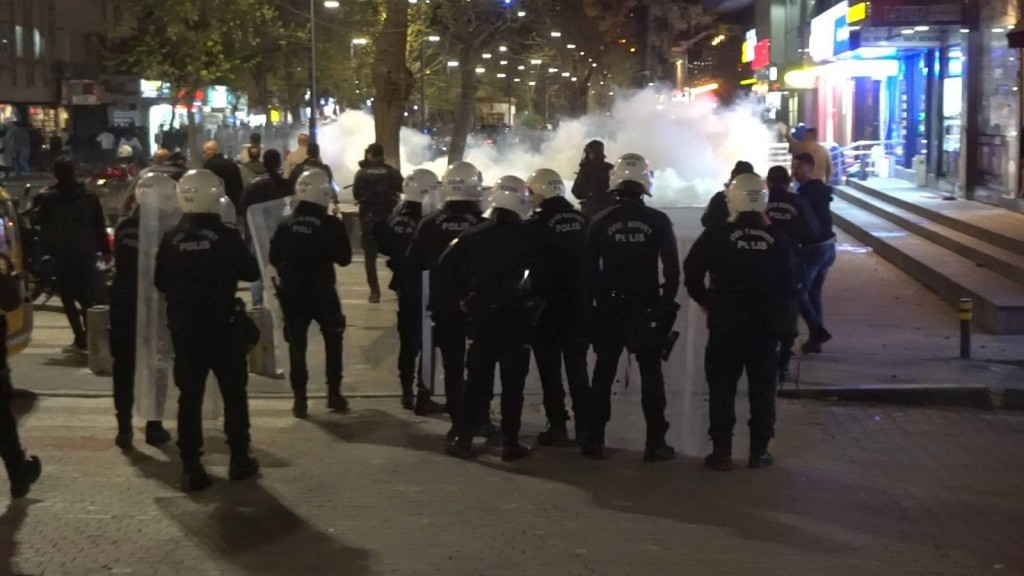The level of violence and oppression that journalists in Turkey face is escalating by the day – and women journalists are on the front line. After the publication of a police directive in May to prevent audiovisual reporting on protests, the number of incidents in which women journalists were physically assaulted by the police or prevented from covering public demonstrations has risen. In July, Turkey registered 10 physical assaults against women journalists, the second-highest number of among countries surveyed by the Coalition for Women in Journalism. Women journalists have been dragged on the ground, pushed around, and even beaten and injured. Moreover, the government does not hesitate to turn physical attacks on women journalists into political repression: physical violence is often followed by detention.
But the attacks on women journalists in Turkey aren’t limited to the streets. As independent journalism in Turkey shifts online at an accelerating pace, women journalists occupy an increasingly precarious position on digital platforms. The fact that women journalists are disproportionately targeted by cyberbullying, harassment, and abuse on digital platforms raises huge concerns about their physical and psychological safety. Online harassment against women journalists in Turkey mostly takes the form of hate-filled rhetoric and insults with a patriarchal and misogynistic tint.
Women journalists in Turkey face threats online based on a wide range of topics, from the media outlets where they produce and share news to their personal lives. In addition to being exposed to defamation and insults online, women journalists are also attacked and intimidated via their personal phones, which is a consequence of easily accessed information found online. Furthermore, the threats received by women journalists not only target them but also their family members and relatives.
Online harassment usually comes in an individual form where women journalists are targeted by individual users attacking them and their private lives. Eylem Yılmaz, a freelance journalist who previously worked for various news outlets including Agos, T24, and Radikal, and has faced online harassment, told IPI that threats of rape have been on the rise. She shared her recent experience: “My phone number has been shared on a Russian dating website. After making an announcement stating ‘I will sue’ and ‘I will find out who it is,’ I was able to halt the calls and texts. I’m still receiving texts now and then. I am subjected to a great deal of verbal abuse and harassment including rape threats.”
Online harassment and abuse can also be perpetrated in the form of organized attacks by politically motivated troll groups targeting certain news content. In many cases, anonymous accounts opened by extremist political groups specifically target women journalists who are openly critical of the government, and they use abuse and harassment as a tool to intimidate and silence them. Yılmaz stated that she was targeted on digital platforms due to her news articles on the Kurdish problem. “I was targeted because of the news I prepared on the Kurdish issue. Working on this problem touches a sensitive spot for some people. With such news, you create an area outside of the hostility and polarization that is sought to be generated [by political authorities]. And you make things visible that they don’t want to be seen or heard, which disturbs them. Then they try to find ways of intimidating you [into] silence”, Yılmaz said. She added that she was also occasionally subjected to online harassment due to her critical comments on the country’s political agenda.
Gülfem Karataş, a member of the Women and LGBTI+ Commission of the Journalists’ Union of Turkey (TGS), highlighted that while it is tough enough to be a journalist in Turkey, being a women journalist is even more difficult and that being targeted by online harassment is only one of the main problems.
Karataş stated that the TGS Women and LGBTI+ Commission has been raising concerns about online abuse and providing both legal and psychological support to women journalists who have been harassed. “Women journalists are sometimes attacked for the news they share, and sometimes for their thoughts. Some political circles may easily attack you if you are a well-known journalist”, Karataş said. Stressing that government-controlled media is another vessel used to harass journalists and minority groups, she added: “We are well aware that Kaos GL [a civil society group working on LGBTI+ rights] has been targeted by [pro-government] newspapers such as Milat and Yeni Şafak. Uncertainty about what they will do or how far they would go, as well as discrimination against women, actually increase our will to continue fighting. For this reason, we need more women and LGBTI+ journalists to unionize, share our stories, and fight together.”
There is a widespread sentiment in Turkey that online harassment causes or encourages physical violence. According to a recent global survey by UNESCO and the International Center for Journalists, 20 percent of women journalists surveyed said they had been attacked offline in connection to the harassment they received online. This link underscores the need for urgent attention to the issue by authorities, tech companies, media outlets, journalism organizations, and unions.
On the other hand, the Turkish government’s hostile and repressive attitude toward journalists, and the increasing pressure on free media in recent years, are leading impediments in combatting online abuse and harassment. Journalists in Turkey have to deal not only with online abuse from individuals but also systematic harassment from the state.
Taking legal action against online harassment and abuse in Turkey appears to be an uncertain, and sometimes ineffective, path to seek remedy for women journalists due to a highly politicized judiciary that fails to protect journalists’ rights especially if they are critical of the government. Noting that her Twitter account was previously hacked, Yılmaz said that she has never taken legal action on online harassment cases and did not even respond to the Twitter users who targeted her. She said that she is unable to avoid being targeted by online harassment, and the only thing she can do is keep her social media accounts as secure as possible.
Online harassment can amount to a crime under Turkish law. In addition to threats, sexual harassment sent via electronic communication is a criminal offense that can land perpetrators in prison for up to two years. However, there is a clear lack of implementation of preventive steps and sanctions by legal authorities. What the Turkish government needs to do is to end its hostile attitude against women journalists first, and then guarantee that the legal framework in place protects journalists’ rights and safety.




